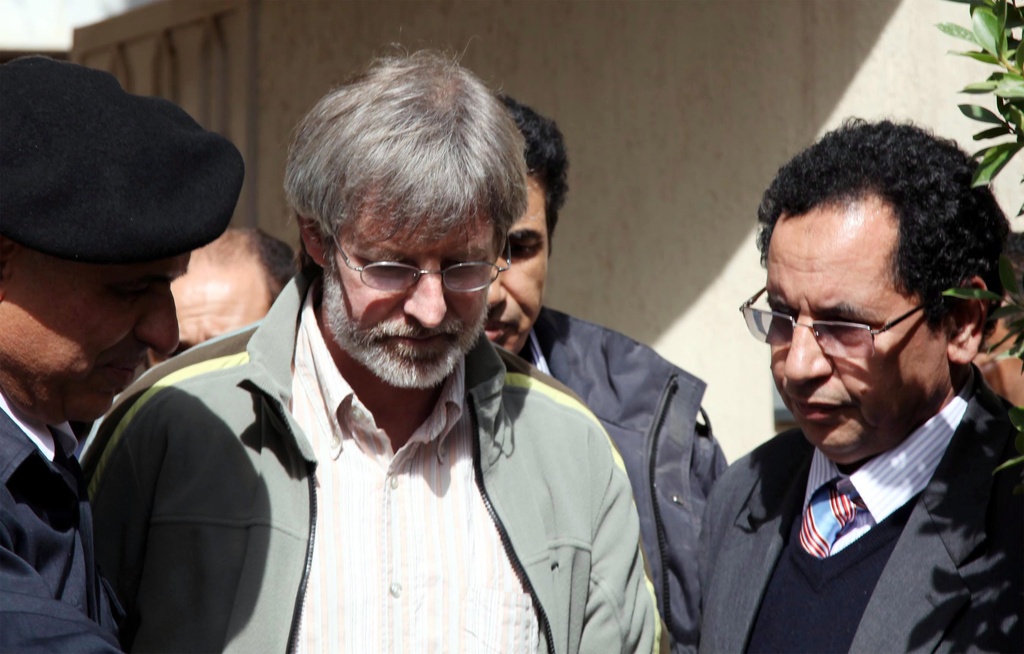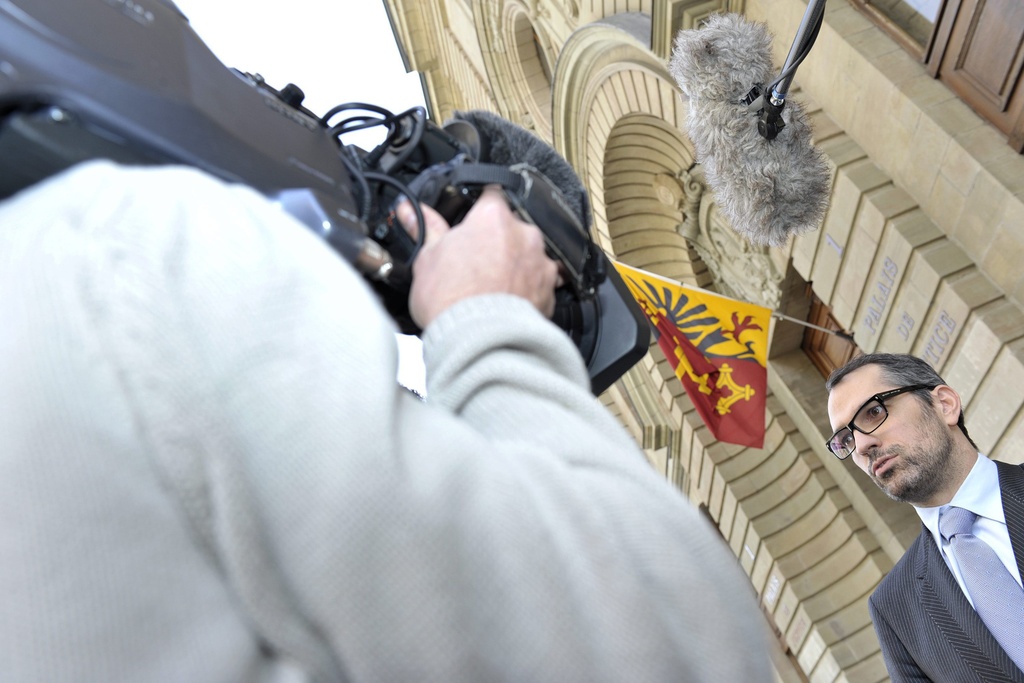Swiss guardedly hopeful after Göldi release

News that Max Göldi, the businessman detained in Libya since July 2008, has been released from jail, has been greeted with cautious optimism in Switzerland.
Swiss Foreign Minister Micheline Calmy-Rey, who is currently in the United States, said it was a “relief” and she was “very happy”.
Speaking from New York, Calmy-Rey also thanked “our European Union partners, particularly Spain and Germany, for their support”.
“This is one stage in a strategy. Now it’s important for him to be able to return home and see his family again, and this is what we are working on,” she told French-language Swiss radio.
But she warned that the case was not yet over, pointing out that Göldi and a second Swiss businessman, Rachid Hamdani, had been prevented from leaving Libya for nearly 18 months before Göldi went to prison.
“We wouldn’t want to see the same pattern being repeated. I am really hopeful that he will be able to leave in the next few days, but there is no guarantee,” she told the radio.
Swiss President Doris Leuthard told the radio that the release was a “first step” and that Libya had behaved “properly”. But she, too, warned that no-one knew how long it would take for Göldi to get an exit visa.
“Wonderful” news
Daniel Graf of the human rights organisation, Amnesty International, which has followed the case closely, told swissinfo.ch that he hoped Göldi would be given an exit visa shortly.
“I’m more optimistic than before, because we learned today that Micheline Calmy-Rey said that German and Spain helped with the release of Max Göldi.
“With the support and the help of these two important European countries it seems that he could soon be back in Switzerland,” he said.
Hamdani, who was eventually found not guilty of the charges brought against him by the Libyan authorities, also welcomed Göldi’s release.
“It’s wonderful!” he told the French-language Le Matin newspaper.
“The Libyan foreign minister gave his word that the authorities would respect the law and they did,” he said.
Göldi had served almost four months in prison after being found guilty of visa violations, and was due to be released on June 12.
He is currently in a hotel in Tripoli, his Libyan lawyer, Salah Zahaf, announced on Thursday evening.
“He is physically and mentally in good shape,” he told journalists. He said Göldi had already met representatives of the Swiss authorities.
He added that he expected his client to leave Libya at the weekend.
European relief
A spokeswoman for the Spanish presidency of the European Union welcomed the release, and said efforts were underway to procure an exit visa.
She said Spanish Foreign Minister Miguel Angel Moratinos had been closely involved in efforts to find a solution to the dispute.
“And the work is not yet over,” she added.
A spokesman for the German foreign ministry expressed “relief” that Göldi was free.
The European Union released a statement welcoming the release, and expressing the hope that Göldi would soon be home, saying this would be “an important step on the way towards the resolution of the bilateral crisis between Libya and Switzerland.”
The statement said that the key to resolving the dispute between Switzerland and Libya lay in “dialogue and positive gestures by both sides”.
Diplomatic row
Although Libya claims that Göldi’s imprisonment was a purely legal matter, in Switzerland he is commonly regarded as a pawn in a diplomatic row between the two countries.
The row was triggered by the 2008 arrest in Geneva of Hannibal Gaddafi, one of Libyan leader Moammar Gaddafi’s sons. Hannibal and his wife were briefly detained after accusations that they had mistreated two of their servants, a Moroccan and a Tunisian, while staying in a luxury hotel in the city.
They were released on bail, and the servants later withdrew the charges after receiving compensation.
However, Libya subsequently took a number of economic measures against Switzerland. These included the closing down of Swiss businesses. Göldi and Hamdani were prevented from leaving the country.
Both had faced trials for visa violations and conducting business in the country illegally. Hamdani was acquitted of the first charge on appeal, and found not guilty of the second. Göldi’s initial sentence of 16 months on the visa charge was reduced to four on appeal. He was fined on the second charge.
The Swiss-Libyan diplomatic row became pan-European when Tripoli said it would stop issuing entry visas to most EU citizens in retaliation for a Swiss imposition of Europe-wide visa restrictions on some top Libyans.
Matters came to a head in February when Libyan security forces surrounded the Swiss embassy in Tripoli where Göldi had taken refuge. A number of European ambassadors went to the embassy to show their solidarity.
The stand-off was resolved when Göldi left in handcuffs to start his jail term, and Hamdani was allowed to return to Switzerland.
Follow-up
During previous negotiations aimed at obtaining the release of the two men, Switzerland and Libya agreed to set up a tribunal to investigate the circumstances surrounding the arrest of Hannibal.
Although Switzerland appointed its representative almost immediately, the Libyan side did not meet the agreed deadline, and the tribunal has never met.
Calmy-Rey refused to comment on what negotiations might now be underway, as this is part of the government’s current strategy.
However, the Libyan newspaper Quryna, quoted by the Italian news agency, has said there is to be a meeting between the prime minister and a high-ranking Swiss delegation in Tripoli on Friday.
The aim would be to “try to put an end to the crisis” between the two countries, the paper explained.
As for human rights in Libya, Graf told swissinfo.ch that once Göldi is home, Amnesty will close his file, but continue to follow the situation in the country.
“There are many other files open of people who are imprisoned in Libya and we will work on those,” he said.
swissinfo.ch and agencies
July 15, 2008: Hannibal Gaddafi and his wife are arrested and charged with abusing their staff. They are released on bail and leave Switzerland. The servants are later compensated and charges withdrawn.
July: Swiss nationals Max Göldi and Rachid Hamdani are arrested. Swiss businesses are forced to shut their offices and the number of flights to Tripoli is cut.
January 2009: A diplomatic delegation travels to Tripoli.
May: Swiss foreign minister visits Libya.
June: Libya withdraws most assets from Swiss bank accounts.
August: The Swiss president apologises in Tripoli for the arrest.
September: Göldi and Hamdani cannot leave the country despite a promise they would be freed by September 1.They disappear after undergoing a medical check-up in Tripoli.
October: A 60-day limit for normalising relations passes.
November: Swiss ministers say they will pursue visa restrictions for Libyans. On November 30 Göldi and Hamdani sentenced to 16 months in prison and fined for visa violations.
January 2010: Their terms are overturned and cut.
February 14: A Libyan newspaper reports Switzerland has drawn up a blacklist of 188 top Libyans.
February 15: Libya stops issuing visas to citizens of nations in the Schengen zone.
February 17-18: Swiss, Libyan, Italian, Spanish and Maltese foreign ministers try to hammer out a solution.
February 22: Göldi ordered to report to prison. Libya says it will retalitate if Switzerland does not hand him over. Hamdani obtains an exit visa.
February 25: Gaddafi calls for jihad against Switzerland, saying it is an infidel country destroying mosques.
March 3: Libya declares a trade and economic embargo of Switzerland.
March 27: Libya lifts a visa ban on citizens of 25 European countries after EU president Spain says a Swiss-instigated visa blacklist against 188 Libyans in those countries is scrapped.
April 13: A Geneva court backs a claim by Hannibal Gaddafi that the publication of leaked police photos of him by a Swiss newspaper infringed his privacy. It also rejects Hannibal’s claim for 100,000 Swiss francs ($95,000) in damages.
June 10: Göldi is released from jail and moves to a Tripoli hotel.

In compliance with the JTI standards
More: SWI swissinfo.ch certified by the Journalism Trust Initiative












You can find an overview of ongoing debates with our journalists here . Please join us!
If you want to start a conversation about a topic raised in this article or want to report factual errors, email us at english@swissinfo.ch.